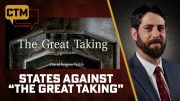
Like the Energizer Bunny, Senator Elizabeth Warren’s brainchild, the Consumer Financial Protection Bureau (CFPB), “keeps going and going.” On Monday the Supreme Court announced it will take at the CFPB, this time looking at how it’s being illegally funded by the Federal Reserve.
The CFPB, created by language buried in the Dodd-Frank Act of 2010 in response to the financial crisis of 2008, was designed by Senator Warren to avoid any manner of restraint: It would operate independently of Congress or the president, and would be funded by the Federal Reserve, where the agency’s 1,600 employees are located.
Efforts to rein in the rogue bureau, or abolish it altogether, have failed. It continues to harass any private company of sufficient size to catch its attention: banks, credit unions, securities firms, payday lenders, mortgage-servicing companies, foreclosure-relief services, debt collectors, and others.
It violates the separation of powers doctrine upon which the American Republic is based. It writes its own rules, it enforces its own rules, and punishes those companies which it finds has violated those rules. And, as mentioned above, it gets its funding not from Congress, but from the Federal Reserve.
Sometimes the fines the CFPB levies are in the millions of dollars. In fact, the bureau boasted that it had “extracted nearly $12 billion” in fines and “refunds” from the financial services sector of the U.S. economy in its first six years of operation.
In 2013, the House Financial Services Committee criticized the bureau, citing its lack of transparency and accountability. A lawsuit filed that same year claimed that “CFPB’s structure insulates it from political accountability and internal checks and balances in violation of the United States Constitution.”
In 2016, Judge Brett Kavanaugh, while on the U.S. Court of Appeals for the District of Columbia, wrote:
The director of the CFPB possesses more unilateral authority — that is, authority to take action on one’s own, subject to no check — than any single commissioner or board member in any other independent agency in the U.S. government.
The CFPB’s concentration of enormous executive power in a single, unaccountable, unchecked director not only departs from settled historical practice, but also poses a far greater risk of arbitrary decision-making and abuse of power, and a far greater threat to individual liberty, than does a multi-member independent agency.
And still the Bunny keeps going and going…
However, in October, the Fifth Circuit Court of Appeals ruled in a lawsuit brought by the Community Financial Services Association of America (CFSAA) on behalf of its many members injured by the agency that its funding mechanism is unconstitutional. The appeal will be heard by the high court this fall, with its ruling expected in June 2024.
Noted Christian Vergonis, the lawyer for the CFSSA:
The CFPB’s self-funding mechanism lacks any contemporary or historical precedent, improperly shields the agency from congressional oversight and accountability, and unconstitutionally strips Congress of its power of the purse under the Appropriations Clause of the Constitution.
The law firm McGlinchy Stafford predicts a substantial disruption if the high court cuts the agency’s funding legs out from underneath it. It could not only end the agency’s operation altogether, but also render inoperative those rules and regulations it imposed while operating illegally. The firm said:
If all regulations that the CFPB has adopted for the last eleven years are thrown out, all that certainty and all those market expectations disappear and [would be] replaced by confusion and uncertainty.
The agency itself said such an outcome would create the proverbial “parade of horribles,” including “undermining any and all rules amended or promulgated by the CFPB, [and would call] into question any enforcement actions it has taken.”
That would be called freedom! The market would adjust quickly, breathing the clean air of liberty from oppression by a rogue agency bent on applying its own rules according to its own agenda without any oversight or limitation.
May the Supreme Court finally seize the opportunity to pull the plug on the CFPB!
Related articles:
15 States Try to Rein In Consumer Financial Protection Bureau
Constitutionalist Judge Stands Up to Unconstitutional Consumer Financial Protection Bureau
Supreme Court Hears Arguments Today on Critical Separation of Powers Case




